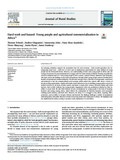| dc.contributor.author | Yeboah, Thomas | |
| dc.contributor.author | Chigumira, Easther | |
| dc.contributor.author | John, Innocensia | |
| dc.contributor.author | Anyidoho, Nana Akua | |
| dc.contributor.author | Manyong, Victor | |
| dc.contributor.author | Flynn, Justin | |
| dc.contributor.author | Sumberg, James | |
| dc.date.accessioned | 2022-04-07T12:43:06Z | |
| dc.date.available | 2022-04-07T12:43:06Z | |
| dc.date.issued | 2020-04-22 | |
| dc.identifier.citation | Yeboah, T.; Chigumira, E.; John, I.; Anyidoho, N.A.; Manyong, V.; Flynn, J. and Sumberg, J. (2022) Hard Work and Hazard: Young People and Agricultural Commercialisation in Africa, Journal of Rural Studies, Volume 76, 2020, Pages 142-151, DOI: 0.1016/j.jrurstud.2020.04.027 | en |
| dc.identifier.uri | https://opendocs.ids.ac.uk/opendocs/handle/20.500.12413/17297 | |
| dc.description.abstract | An emerging orthodoxy supports the proposition that the rural economy – built around agriculture but encompassing much more – will serve as sweet spot of employment opportunities for many millions of young people into the foreseeable future. However, our understanding of how rural young people in Africa take advantage of processes of rural transformation or engage with the rural economy is limited. Drawing on qualitative research conducted with 117 rural young people in three country contexts (Ghana, Zimbabwe and Tanzania), this paper reports the findings on the steps and pathways through which young people construct livelihoods in hotspots of agricultural commercialisation. Overall what emerges from a diversity of backgrounds, experiences and pathways is that the commercialised rural economy within which they operate offer them a variety of income earning opportunities. Family and broader social relations are key in enabling young people to access the needed resources in the form of land, capital, and inputs to begin their ventures. Between family and rental markets, there is little evidence that young people’s engagement with crop production is limited by their inability to access land. We also find evidence of asset accumulation by young people in the form of housing, furniture and savings among others, which reflects the combination of relatively dynamic rural economies, enabling social relations, and hard work. However, for many it is a struggle to stay afloat, requiring effort, persistence, and an ability to navigate setbacks and hazards. Our findings challenge a number of assumptions underlying policy and public discourse around rural young people and employment in Africa. We highlight some key implications for policy seeking to promote youth employment in rural Africa. | en |
| dc.language.iso | en | en |
| dc.publisher | Elsevier Ltd. | en |
| dc.rights.uri | http://creativecommons.org/licenses/by-nc-nd/4.0/ | en |
| dc.subject | Agriculture | en |
| dc.subject | Children and Youth | en |
| dc.subject | Participation | en |
| dc.subject | Rural Development | en |
| dc.subject | Work and Labour | en |
| dc.title | Hard Work and Hazard: Young People and Agricultural Commercialisation in Africa | en |
| dc.type | Article | en |
| dc.rights.holder | © 2020 The Authors | en |
| dc.identifier.externaluri | https://www.sciencedirect.com/science/article/pii/S0743016719309672 | en |
| dc.identifier.team | Rural Futures | en |
| dc.identifier.doi | 10.1016/j.jrurstud.2020.04.027 | |
| dcterms.dateAccepted | 2020-04-14 | |
| rioxxterms.funder | Department for International Development, UK Government | en |
| rioxxterms.identifier.project | APRA | en |
| rioxxterms.version | VoR | en |
| rioxxterms.versionofrecord | 10.1016/j.jrurstud.2020.04.027 | en |
| rioxxterms.funder.project | e1f6d3be-457a-4f13-8b1f-6748d1402d83 | en |


